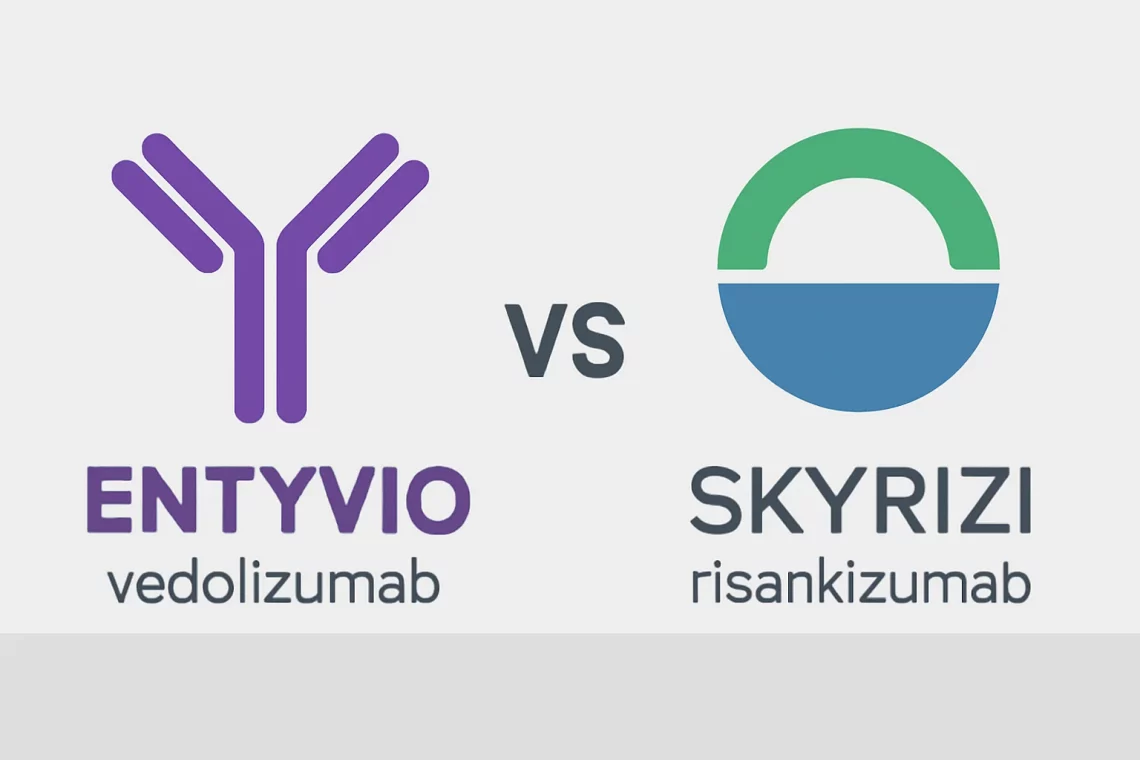
Entyvio vs Skyrizi: A Comprehensive Comparison for Patients
In the realm of modern medicine, the treatment landscape for chronic autoimmune conditions has evolved significantly over the past few years. With advancements in biopharmaceuticals, patients now have more options than ever before. Among these, Entyvio and Skyrizi have emerged as popular choices for managing conditions such as ulcerative colitis and Crohn’s disease, as well as psoriasis and psoriatic arthritis. Both medications are designed to target specific pathways in the immune system, aiming to reduce inflammation and improve the quality of life for patients.
As these treatments gain traction, patients and healthcare providers must navigate their unique attributes, benefits, and potential side effects. Understanding the nuances of each medication is crucial for making informed decisions about treatment options. This article delves into the characteristics, mechanisms, and considerations surrounding Entyvio and Skyrizi, providing valuable insights for both patients and healthcare professionals.
Understanding Entyvio’s Mechanism and Applications
Entyvio, known generically as vedolizumab, is a monoclonal antibody specifically designed to target the gut. It is primarily used for the treatment of ulcerative colitis and Crohn’s disease, conditions characterized by chronic inflammation of the gastrointestinal tract. The medication works by inhibiting the migration of inflammatory cells to the gut, thereby reducing inflammation and promoting healing.
One of the standout features of Entyvio is its gut-selective mechanism of action. Unlike some other biologics that affect the entire immune system, vedolizumab’s targeted approach minimizes systemic side effects and focuses on the areas most affected by the disease. This specificity can lead to a more favorable safety profile, making Entyvio a preferred option for many patients.
Entyvio is administered via intravenous infusion, typically every eight weeks after an initial loading dose. This schedule can be more manageable for patients who prefer fewer injections compared to other treatments. The infusions can be done in a healthcare setting, which allows for monitoring during the administration.
Patients often report a positive response to Entyvio, with many experiencing significant improvements in their symptoms, including reduced abdominal pain, decreased frequency of bowel movements, and improved overall well-being. However, as with any medication, there are potential side effects. Common adverse reactions may include headache, nausea, and fatigue, but serious complications like infections can occur and require careful monitoring.
Overall, Entyvio has proven to be a valuable option for many individuals struggling with inflammatory bowel diseases, offering both efficacy and a relatively favorable safety profile.
Exploring Skyrizi’s Role in Immune Modulation
Skyrizi, or risankizumab, represents a newer class of biologic therapy aimed at treating moderate to severe plaque psoriasis and psoriatic arthritis. As a humanized monoclonal antibody, Skyrizi targets the interleukin-23 (IL-23) pathway, a key player in the inflammatory process associated with these conditions. By inhibiting IL-23, Skyrizi helps to reduce the inflammatory response and alleviate the symptoms of psoriasis.
One of the notable aspects of Skyrizi is its dosing regimen. Unlike some biologics that require frequent injections, Skyrizi is administered as a subcutaneous injection, typically every 12 weeks after initial loading doses. This extended dosing interval can enhance patient adherence and convenience, as it reduces the frequency of injections.
Clinical studies have demonstrated Skyrizi’s effectiveness in significantly clearing psoriasis plaques and improving joint symptoms in patients with psoriatic arthritis. Many patients report rapid and sustained improvement, with some achieving clear or almost clear skin after treatment. This efficacy can lead to a substantial improvement in quality of life, allowing individuals to engage more fully in daily activities.
However, like Entyvio, Skyrizi is not without potential side effects. Common adverse reactions may include injection site reactions, headache, and fatigue. More serious risks, such as an increased chance of infections due to immune modulation, necessitate careful patient selection and monitoring.
For individuals suffering from psoriasis and psoriatic arthritis, Skyrizi offers a promising option, particularly for those who have not responded adequately to conventional therapies.
Comparative Effectiveness of Entyvio and Skyrizi
When considering treatment options, understanding the comparative effectiveness of Entyvio and Skyrizi is essential. While both medications have demonstrated efficacy in their respective indications, they target different conditions and pathways within the immune system.
Entyvio is primarily focused on gastrointestinal diseases, specifically ulcerative colitis and Crohn’s disease. Its gut-selective mechanism allows for targeted treatment, which can lead to significant improvements in gastrointestinal symptoms and overall disease management. In clinical trials, a substantial percentage of patients treated with Entyvio have achieved clinical remission and mucosal healing, making it a cornerstone in the management of inflammatory bowel disease.
On the other hand, Skyrizi targets inflammatory skin conditions, particularly plaque psoriasis and psoriatic arthritis. Its efficacy in clearing skin lesions and reducing joint pain has been well-documented. Patients often experience rapid improvements, with many achieving long-lasting remission after initiation of therapy.
Choosing between these treatments largely depends on the patient’s specific diagnosis and treatment goals. For individuals with inflammatory bowel disease, Entyvio is the clear choice, while those with psoriasis or psoriatic arthritis may benefit more from Skyrizi.
It’s also important to consider the safety profiles and potential side effects of each medication. While both drugs can increase the risk of infections, the specific risks may vary. Healthcare providers must evaluate individual patient factors, including previous treatment responses and comorbidities, to tailor the most appropriate therapy.
In summary, both Entyvio and Skyrizi have established themselves as effective options within their therapeutic domains. A thorough discussion between patients and their healthcare providers can help determine the best course of action based on individual needs and conditions.
Patient Experiences and Considerations
When evaluating treatment options like Entyvio and Skyrizi, understanding patient experiences can provide valuable insights. Many patients report varying degrees of satisfaction with both medications, influenced by factors such as efficacy, side effects, and the overall impact on their quality of life.
Patients using Entyvio often highlight the benefits of its gut-targeted approach, particularly for those who have struggled with debilitating gastrointestinal symptoms. Many report significant relief from symptoms such as diarrhea and abdominal pain, often leading to an improved ability to engage in daily activities and social interactions. However, some users have noted the inconvenience of intravenous infusions, particularly during busy schedules or for those living far from healthcare facilities.
Conversely, Skyrizi users frequently praise the convenience of its subcutaneous administration and extended dosing intervals. This ease of use can enhance adherence and reduce the mental burden associated with frequent injections. Patients often express satisfaction with the rapid onset of action, reporting visible improvements in their skin within weeks of starting treatment. However, some individuals may experience injection site reactions, which can be a downside for a portion of the user population.
Both medications require ongoing monitoring and communication between patients and healthcare providers to manage potential side effects and assess treatment efficacy. Establishing a strong therapeutic alliance can empower patients to voice their concerns and experiences, ultimately leading to more personalized and effective care.
In conclusion, while both Entyvio and Skyrizi offer unique benefits and challenges, patient experiences underscore the importance of individualized treatment plans. By considering personal preferences and specific health needs, patients can work with their healthcare providers to find the most suitable therapy.
**Disclaimer**: This article is for informational purposes only and does not constitute medical advice. Always consult with a healthcare professional regarding medical conditions and treatments.




